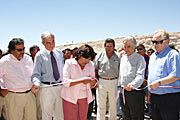Pressmeddelande
A Roof for ALMA
Roof-Topping Ceremony Held for the ALMA OSF
14 mars 2007
On 10 March, an official ceremony took place on the 2,900m high site of the Atacama Large Millimeter/submillimeter Array (ALMA) Operations Support Facility, from where the ALMA antennas will be remotely controlled. The ceremony marked the completion of the structural works, while the building itself will be finished by the end of the year. This will become the operational centre of one of the most important ground-based astronomical facilities on Earth.
The ceremony, known as 'Tijerales' in Chile, is the equivalent to the 'roof-topping ceremony' that takes place worldwide, in one form or another, to celebrate reaching the highest level of a construction. It this case, the construction is the unique ALMA Operations Support Facility (OSF), located near the town of San Pedro de Atacama.
"The end of this first stage represents an historic moment for ALMA," said Hans Rykaczewski, the European ALMA Project Manager. "Once completed in December 2007, this monumental building of 7,000 square metres will be one of the largest and most important astronomical operation centres in the world."
ALMA, located at an elevation of 5,000m in the Atacama Desert of northern Chile, will provide astronomers with the world's most advanced tool for exploring the Universe at millimetre and submillimetre wavelengths. ALMA will detect fainter objects and be able to produce much higher-quality images at these wavelengths than any previous telescope system.
The OSF buildings are designed to suit the requirements of this exceptional observatory in a remote, desert location. The facility, which will host about 100 people during operations, consists of three main buildings: the technical building, hosting the control centre of the observatory, the antenna assembly building, including four antenna foundations for testing and maintenance purposes, and the warehouse building, including mechanical workshops. Further secondary buildings are the transporter shelters and the vehicle maintenance facilities as well as the ALMA gate house. The construction started in August 2006 and will be completed in December 2007.
The ceremony took place in the presence of representatives of the regional authorities, members of the Chilean Parliament, and representatives of the local community, including the mayor of San Pedro, Ms. Sandra Berna, who joined more than 40 representatives of ESO, NRAO and NAOJ - the organisations that are, together, building ALMA.
"This is certainly a big step in the realisation of the ALMA Project. The completion of this facility will be essential for assembly, testing and adjustment as well as operation and maintenance of all ALMA antennas from Europe, North America and from Japan," said Ryusuke Ogasawara, the representative of NAOJ in Chile.
"This is a tremendous achievement and represents a major milestone for the ALMA project," said Adrian Russell, North American Project Manager for ALMA.
The first ALMA antennas, the prototypes of which successfully achieved their first combined astronomical observation last week, are expected to arrive at the ALMA site in a few months. These huge antennas will travel in pieces from Europe, USA and Japan and will be assembled next to the OSF building.
The Atacama Large Millimeter/submillimeter Array (ALMA), an international astronomy facility, is a partnership among Europe, Japan and North America, in cooperation with the Republic of Chile. ALMA is funded in Europe by the European Organisation for Astronomical Research in the Southern Hemisphere, in Japan by the National Institutes of Natural Sciences (NINS) in cooperation with the Academia Sinica in Taiwan and in North America by the U.S. National Science Foundation (NSF) in cooperation with the National Research Council of Canada (NRC). ALMA construction and operations are led on behalf of Europe by ESO, on behalf of Japan by the National Astronomical Observatory of Japan (NAOJ) and on behalf of North America by the National Radio Astronomy Observatory (NRAO), which is managed by Associated Universities, Inc. (AUI).
Om pressmeddelandet
| Pressmeddelande nr: | eso0713 |
| Legacy ID: | PR 13/07 |
| Namn: | ALMA OSF |
| Typ: | Unspecified : Technology : Observatory : Facility Unspecified : People : Scientist |
| Facility: | Atacama Large Millimeter/submillimeter Array |



